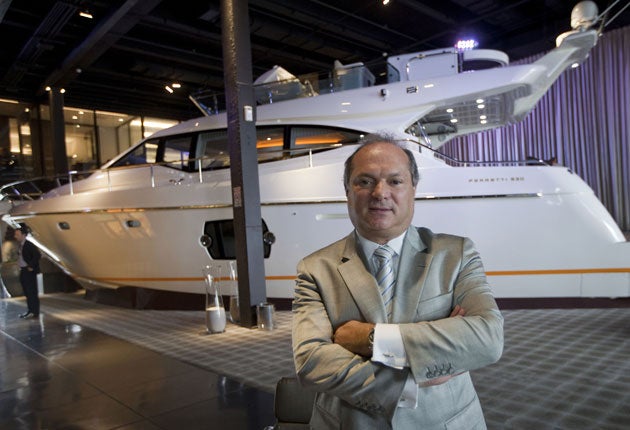Brazil's super-rich take to high seas
The luxury yacht market is booming in South America's biggest country. Bradley Brooks reports from São Paulo

Your support helps us to tell the story
From reproductive rights to climate change to Big Tech, The Independent is on the ground when the story is developing. Whether it's investigating the financials of Elon Musk's pro-Trump PAC or producing our latest documentary, 'The A Word', which shines a light on the American women fighting for reproductive rights, we know how important it is to parse out the facts from the messaging.
At such a critical moment in US history, we need reporters on the ground. Your donation allows us to keep sending journalists to speak to both sides of the story.
The Independent is trusted by Americans across the entire political spectrum. And unlike many other quality news outlets, we choose not to lock Americans out of our reporting and analysis with paywalls. We believe quality journalism should be available to everyone, paid for by those who can afford it.
Your support makes all the difference.Marcio Christiansen reels off tales of the growing ranks of rich Brazilians who visit his Ferretti yacht showroom, where clients sip espressos on an oversized sable sofa and electronic music bubbles in the air.
One man paid $2m (£1.2m) for a ship, Mr Christiansen said, after succumbing within 30 minutes to his kids' pleas of "Buy it, daddy, buy it!" Another toured the sparkling 53ft yacht on the showroom floor, then asked to discuss it over lunch. "The waiter comes to take our order, and the client asks to borrow a piece of paper," said Mr Christiansen, CEO of Ferretti's Brazil group. "He works out a contract on it and we've agreed to it before I've asked for a sandwich."
Brazil has always had its super-rich with extravagant tastes. But booming commodity prices fuelled by Chinese demand, along with some of the world's biggest offshore oil discoveries, have created an expanding class of wealthy Brazilians. The number of millionaire households in South America's biggest nation is forecast to treble by 2020 to more than a million. They, in turn, are boosting the international yacht market even as it plummets in the US and Europe.
For the Italian Ferretti Group, one of the world's leading yacht builders, sales in Brazil represented less than 5 per cent of global sales in 2007, according to Mr Christiansen. This year, Brazil is expected to account for about 40 per cent of the company's global revenue, or almost $290m.
Ferretti opened a huge $310m shipyard on the outskirts of São Paulo two months ago to meet the new demand. It's expected to produce 120 yachts a year once it reaches capacity. In the past two years, more than a dozen high-end foreign boat makers have either built shipyards in Brazil or have entered into partnership with local dealers to export their wares to the market, despite tariffs of between 70 to 100 per cent on imported vessels.
Annual boat sales in Brazil have grown by 30 per cent since 2008, industry leaders said. Meanwhile, in the US and Europe, sales of high-end boats have dropped by 70 per cent.
Executives in São Paulo now earn more than their counterparts in New York, London, Hong Kong or Singapore, and their disposable income is flooding Brazil's consumer market. When not spending at exclusive shopping centres, Brazilian executives can be seen cruising the seas near Santos, south of São Paulo, Brazil's financial hub, and along the lush green coast north to Rio de Janeiro. The marinas that dot Brazil's 4,600-mile coast are at capacity, and as soon as a vacancy opens, it is snapped up by a new boat owner. "We were always told that Brazil was the 'country of the future' but we didn't know when that would arrive," said Ernani Paciornik, a Brazilian marine industry pioneer, who organises international boat shows across Brazil. "I think the future has arrived."
The ranks of the new rich are growing in other developing countries as well, especially the other members of the so-called Bric group – Russia, India and China. In China the number of millionaire households is set to rise by 91 per cent to 2.5 million by 2020, in Russia by 221 per cent to 1.2 million, and in India by 143 per cent to 694,600, according to the consulting firm Deloitte.
Join our commenting forum
Join thought-provoking conversations, follow other Independent readers and see their replies
Comments